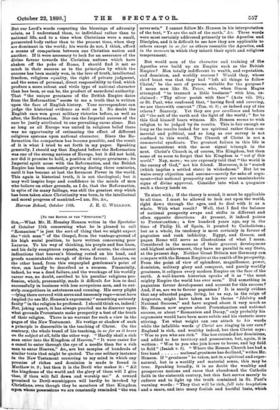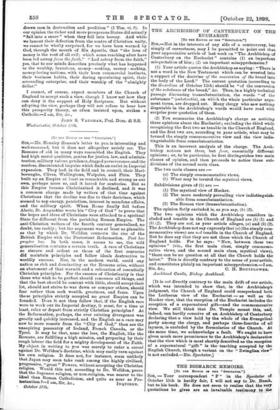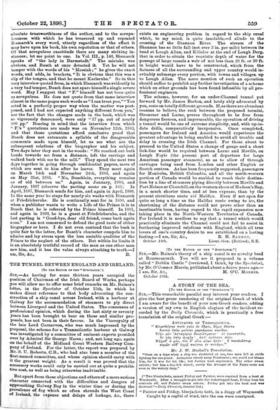free hand . national greatness has declined," writes Mr. Henson.
If " greatness " be taken, not in a spiritual and super- natural, but in a worldly and material sense, this may be true. Speaking broadly, it is no doubt the wealthy and prosperous nations and races that abandoned the Catholic faith in the sixteenth century, but this fact serves merely to enforce and to light up the truth contained in St. Paul's warning words : "They that will be rich, fall into temptation and a snare, and into many foolish and hurtful lusts, which drown men in destruction and perdition" (1 Tim. vi. 9). In our opinion the richer and more prosperous States did actually "fall into a snare" when they fell into heresy. And while we lament their defection from the centre of Christian unity, we cannot be wholly surprised, for we have been warned by God, through the mouth of His Apostle, that "the love of money is the root of all evil; which some reaching after have been led astray from the faith." "Led astray from the faith," yes, that to our minds describes precisely what has happened to the wealthy, luxurious, money - seeking, money - making, money-loving nations, with their keen commercial instincts, their business habits, their daring speculating spirit, their astounding enterprise, and their worship of the "almighty dollar."
I cannot, of course, expect members of the Church of England to accept such a view, though I know not how they can deny it the support of Holy Scripture. But without adopting the view, perhaps they will not refuse to hear how this prosperity theory, so often insisted upon, strikes a Catholic.—I am, Sir, &c.,
JOHN S. VAUGHAN, Prel. Dom. di S.S.
Westminster, October 19th.
[To THE EDITOR OF THE "SPECTATOR.'] SIR,—Mr. Hensley Henson's letter to you is interesting and well-reasoned, but it does not altogether satisfy me. The Romans of old in many ways resembled the English. They had high moral qualities, genius for justice, law, and adminis- tration, military valour, prudence, dogged perseverance, and the restless, discontented impulse which finds an outlet in Imperial expansion. They had, in the field and in council, their Marl- boroughs, Clives, Wellingtons, Walpoles, and Pitts. They built up an Empire at least as remarkable and strong as our own, perhaps more so, and it lasted for centuries. But as this Empire became Christianised it declined, and it was a common charge made by writers of that time against Christians that the decline was due to their doctrines, which seemed to sap energy, patriotism, interest in mundane affairs, and the military spirit. When Rome finally fell before Alaric, St. Augustine wrote his "City of God" to prove that the hopes and ideas of Christians were attached to a spiritual State far different from the perishing Roman Empire. The anti-Christian writers of the fourth century generalised, no doubt, too rashly ; but the argument was at least as plausible as that by which Dr. Welldon connects the rise of the British Empire with the Protestant Reformation. Post hoc propter hoc. In both cases, it seems to me, the wild generalisation contains a certain truth. A race of Christians so sincere and ardent as those of the first centuries did maintain principles and follow ideals destructive to worldly success. Nor, in the modern world, could any nation as rich and dominating as the Romans arise, without an abatement of that warmth and a relaxation of essentially Christian principles. For the essence of Christianity is that those who wish to be perfect should renounce all things, and that the best should be content with little, should accept their lot, should not strive to war down or conquer others, should fear rather than seek wealth, greatness, and fame. Upon these principles strictly accepted no great Empire can be founded. Does it not then follow that, if the English race were to work out its Imperial destiny, it must, for a time at least, relax or depart from strictly Christian principles ? At the Reformation, perhaps, the ever existing divergence was greatly and quickly increased, and the English as a race may now be more remote from the "City of God," than are the unaspiring peasantry of Ireland, French Canada, or the TyroL It may be that, none the less, the English, like the Romans, are fulfilling a high mission, and preparing by their rough labour the field for a mighty development of the Faith. My object in writing to you was merely to enter a caveat against Dr. Welldon's doctrine, which may easily turn against his own religion. It does not, for instance, seem unlikely that Japan may soon take rank among the highly civilised, progressive, "great" Powers, without accepting the Christian religion. Would this not, according to Dr. Welldon, prove that the Japanese religion, or non-religion, was nearer to the ideal than Roman Catholicism, and quite as near as Pro- testantism ?—I am, Sir, &c , INQUIRER. ' October 17th. THE ARCHBISHOP OF CANTERBURY ON THE EUCHARIST.
[To THE EDITOR Of THY 'SPECTATOR.] SIR,—Not in the interests of any side of a controversy, but simply of correctness, may I be permitted to point out that your appreciative article of last week on "The Archbishop of Canterbury on the Eucharist" contains (I) an important misquotation of him ; (2) an important misapprehension ?
(1) Your article quotes the Archbishop as saying : "There is not a word in the New Testament which can be wrested into a support of the doctrine of the conversion of the bread into the body of the Lord." The correct quotation (according to the Guardian of October 12th) should be "of the conversion of the substance of the bread," Sze. Thus, in a highly technical passage discussing transubstantiation, the words "of the substance " (substantia), on which the whole particular argu- ment turns, are dropped out. Many clergy who saw nothing. disputable in the Archbishop's words would have read with surprise your quotation of them.
(2) You summarise the Archbishop's charge as noticing three opinions about the Eucharist; excluding the third while recognising the first two as tenable in the Church of England, and the first two are, according to your article, what may be termed the simply commemorative view and the view indis- tinguishable from consubstantiation.
This is an incorrect analysis of the charge. The Arch- bishop notices not three, but four, essentially different opinions ; or, to be particular, he first distinguishes two main classes of opinion, and then proceeds to notice three sub- divisions of the second main class.
The two main classes are :- (a) The simply commemorative views.
(b) What may be ternied the mystical views.
Subdivisions given of (b) are :—
(1) The mystical view of Hooker.
(2) The more modernly prevailing view indistinguish- able from consubstantiation.
(3) The Roman view (transubstantiation).
The opinion flatly excluded is, as you say, (b) (3).
The two opinions which the Archbishop considers in- cluded and tenable in the Church of England are (b) (1) and (b) (2). They are not, as your article alleges, (a) and (b) (2). The Archbishop does not say expressly that (a) (the simply com- memorative views) are not tenable in the Church of England. But he does say that they are not those which the Church of England holds. For he says: "Now, between these two, opinions" (viz., the first main class, simply commemo- rative views, and the second main class, mystical views), "there can be no question at all that the Church holds the latter." This is directly contrary to the sense of your article, and constitutes plainly an important misapprehension.—I am,
Sir, &c., C. H. BOTITFLO WEL Auckland Castle, Bishop Auckland.
[It is not directly contrary to the main drift of our article, which was intended to show that, in the Archbishop's judgment, the Church of England could comprehend both the Lutheran view of the Eucharist — as well as the Hooker view, that the reception of the Eucharist includes the reception of a supernatural gift—and the commemorative view. We still think that Dr. Temple meant this, and, indeed, can hardly conceive of an Archbishop of Canterbury declaring that a view held by the whole of the Evangelical party smong the clergy, and perhaps three-fourths of all laymen, is excluded by the formularies of the Church. At the same time, we acknowledge a fault. We ought to have given much more prominence to the Archbishop's declaration that the view which is most shortly described as the reception of a supernatural "gift" is the teaching accepted by the English Church, though a variant on the " Zwinglian view' is not excluded.—ED. Spectator.]
THE BISMARCK MEMOIRS.
[To THE EDITOR Of THE "SPECTATOR,"] SIR, — Your correspondent " F " in the Spectator of October 15th is hardly fair, I will not say to Dr. Basch, but to his book. He does not seem to realise that the very quotations he gives are an invaluable testimony to the absolute trustworthiness trustworthiness of the author, and to the scrupu- lousness with which he has treasured up and repeated Bismarck's every word, utterly regardless of the effect it may have upon his book, his own reputation or that of others. Of that scrupulous exactitude there are many striking in- stances; let me point to one. In Vol. III., p. 140, Bismarck speaks of "the lady in Darmstadt." The mistake was obvious, and Busch at once detected it. Yet he will not tamper with the words of his " Messiah; " he gives the exact words, and adds, in brackets, "It is obvious that this was a slip of the tongue, and that he meant Karlsruhe." So in this very interview quoted from, in which Bismarck was evidently in a very bad temper, Busch does not spare himself a single severe word. May I suggest that "F." himself has not been quite as scrupulous. He does not quote from that same interview almost in the same pages such words as "I can treat you,"" You acted in a perfectly proper way when the matter was post- poned, and I had not expected anything different from you," nor the fact that the changes made in the book, which was so vigorously denounced, were only "17 pp. out of nearly 900 pp." Bearing in mind that the interview from which 4. F.'s" quotations are made was on November 12th, 1833, and that those quotations afford conclusive proof that Busch does not extenuate a syllable of the disagreeable comments made upon himself, let us see what are the subsequent relations of the biographer and his subject. Two days later they met in the woods: "He reached out both hands towards me from a distance, left the carriage and walked back with me to the mill." They spend the next two -days together in going through confidential papers, more of which are sent to him after he leaves. They meet again on March 14th and November 24th, 1S84, and again on May 31st, 1835. "No, Buschlein, everything remains as of old between us." Again, in January, MSG, and January, 1887 (observe the parting scene on p. 16;5). In April, 1887, Bismarck sends for him, and again in April, 1888. In the same year he stays for nearly six weeks with Bismarck at Friedrichsruhe. He is continually sent for in 1890, and when a publisher wants to write a Life of the Prince it is to Busch that he is referred by the Prince himself. In 1891, and again in 1893, he is a guest at Friedricheruhe, and the last parting is "Good-bye, dear old friend, come back again soon." I am not concerned to defend the good taste of either biographer or hero. I do not even contend that the book is quite fair to the latter, for Busch's character compels him to admire and lay stress upon the less amiable qualities of the Prince to the neglect of the others. But within its limits it is an absolutely truthful record of the man as one other man saw him, and it has the value always attaching to truth.—I












































 Previous page
Previous page